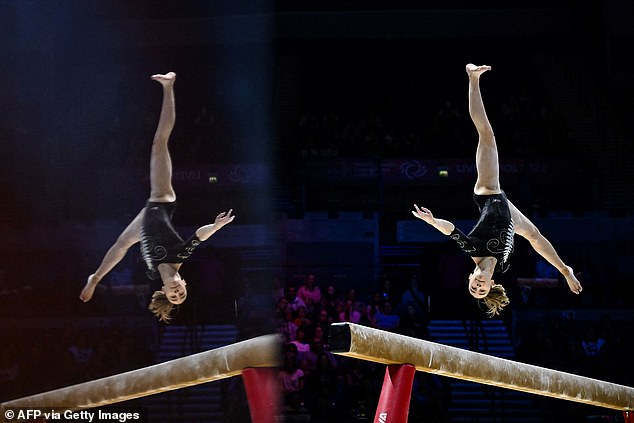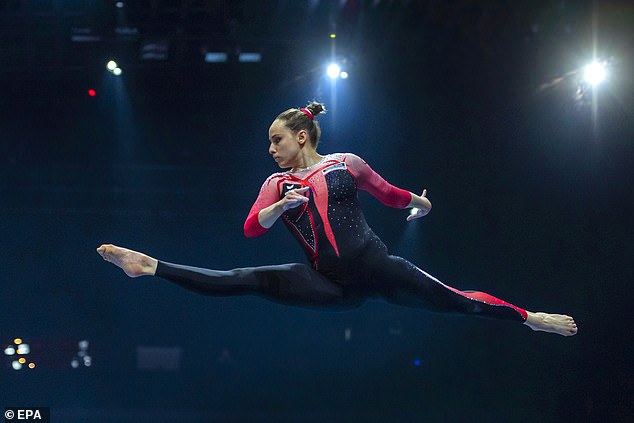Female gymnasts will be allowed to wear SHORTS over their leotards and no longer face penalties for showing their bra strap in New Zealand as country becomes first to scrap ‘archaic’ rules
- New rules only apply to gymnastics competitions held in New Zealand
Female gymnasts in New Zealand will finally be allowed to wear shorts or leggings over their leotards and will no longer be punished for showing their bra straps or wearing visible underwear.
The sport’s governing body, Gymnastics New Zealand (GNZ), said the changes were made after a survey of competitive gymnasts found the rules were “archaic.”
After receiving more than 200 responses, GNZ found that athletes wanted to feel ‘comfortable and safe’ in the sport.
The new rules only apply to competitions organized in New Zealand, meaning the old rules – governed by the International Gymnastics Federation (FIG) – will still apply to competitive gymnasts.
“We felt the regulations surrounding underwear were unclear, unevenly applied and, to be honest, a bit archaic,” GNZ chief executive Andrea Nelson said in a statement.
Female gymnasts in New Zealand will finally be allowed to wear shorts or leggings over their leotards and will no longer be punished for showing their bra straps or wearing visible underwear

The sport’s governing body, Gymnastics New Zealand (GNZ), said the changes were made after a survey of competitive gymnasts found the rules were “archaic”.
‘We’re just making sure that wherever you are in the sport, you have a choice. So no one feels uncomfortable or left out.’
These require women to wear a ‘correct sporty, non-transparent leotard or unitard … which must have an elegant design’.
Female athletes may have between 0.30 and 1.00 points deducted from their final score for dress violations during individual or team routines.
Athletes have previously raised concerns about gymnastics clothing, with the German team choosing to wear full body suits at the Tokyo Olympics in a pushback against the sexualisation of women in sport.
Jennifer Pinches, a British gymnast who represented Team GB at the 2012 London Olympics, said the dress code ‘perpetuated extremely harmful ideals’.
Speaking in 2021, she added: “It seems ridiculous that we police women’s bodies in particular to this extent. Why hasn’t this been updated?’
Sarah Voss, one of the first German gymnasts to wear a unitard, said in 2023: ‘It is at this very vulnerable time (puberty) that young girls often decide to stop gymnastics because they no longer feel good in their bodies . ‘
In February, a study from New Zealand-based Massey University found that uniform design could be contributing to increased anxiety among female athletes when it came to concerns about body image, the visibility of menstrual blood and the visibility of underwear.
Another 2021 survey by Sport New Zealand of female teens found that many left sports and active recreation because they felt uncomfortable in some equipment.
Ms Nelson said relaxing some rules around clothing could keep girls in sport and at least bring the rules for women in line with those for men, who have long been able to wear shorts or trousers.

Germany’s Sarah Voss was one of the first female gymnasts to wear long pants to make a statement against sexual violence in sport, at the 2021 European Artistic Gymnastics Championships
“Gymnastics is a tough enough sport without having to worry about getting deducted because a judge can see your bra strap,” Nelson added.
However, she also pointed out that not all female athletes are critical of the uniforms, telling Radio New Zealand: “We surveyed our competitors across all gymnastics disciplines and what we found was that most girls really enjoy wearing a to wear a leotard. ‘
“But there are gymnasts who just don’t feel comfortable in that attire.”
The survey found that almost 40 percent of New Zealand sporting organizations believed decisions about designing female sporting uniforms should rest primarily with the athletes.
